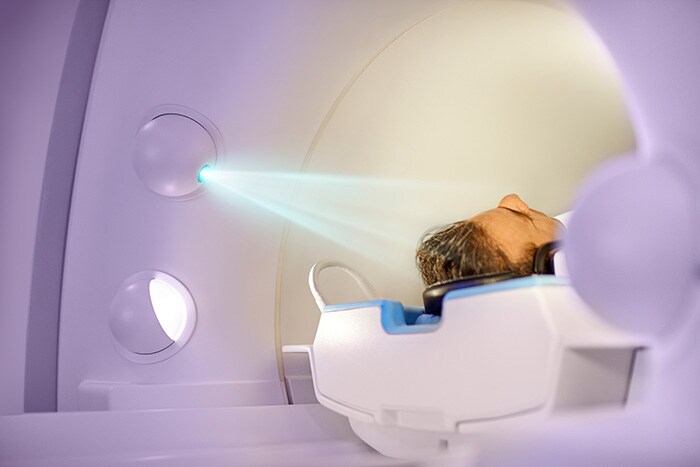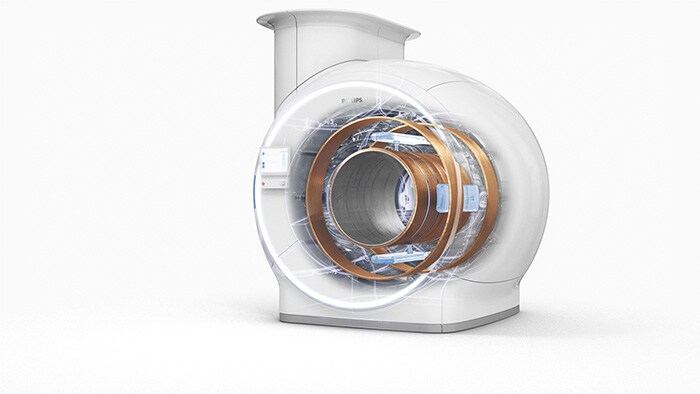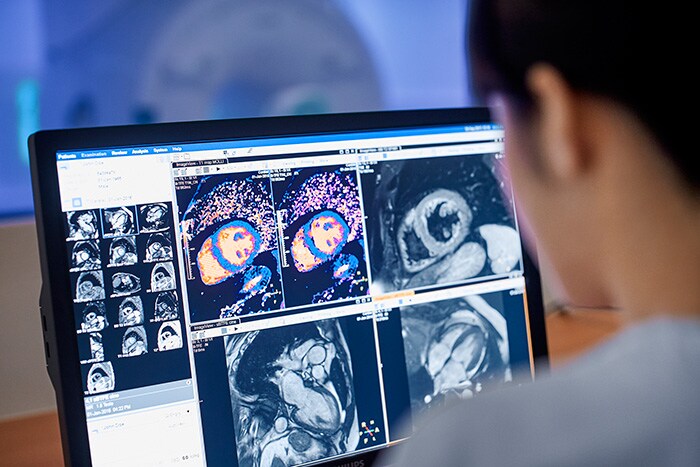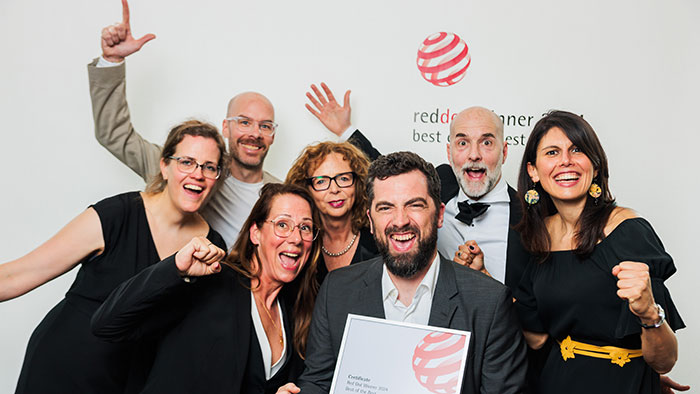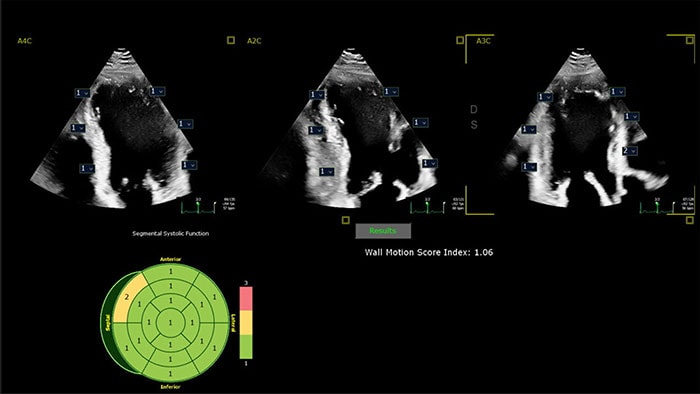Dec 02, 2019
Philips demonstrates innovation leadership in MR at RSNA
Chicago, U.S. and Amsterdam, the Netherlands – Royal Philips (NYSE: PHG, AEX: PHIA), a global leader in health technology, today highlighted its latest advances in MR to help increase productivity, improve the patient and staff experience, and enhance diagnostic confidence. The company recently marked the completion of its one millionth patient scan accelerated with Compressed SENSE, an advanced solution that reduces exam times by up to 50% [1]. At the 2019 Radiological Society of North America (RSNA) Annual Meeting, Philips is also highlighting its Ambition 1.5T MR platform, the industry’s first and only commercially available fully sealed magnet for more productive, helium-free operations [2].
Our accelerated Compressed SENSE scanning technology, combined with a host of smart, AI-powered innovations, enables a step-change in MR speed, productivity and workflow, while improving the experience for patients and staff.
Arjen Radder
General Manager for MR at Philips
“Our accelerated Compressed SENSE scanning technology, combined with a host of smart, AI-powered innovations, enables a step-change in MR speed, productivity and workflow, while improving the experience for patients and staff,” said Arjen Radder, General Manager for MR at Philips. “At RSNA we’re also showcasing our breakthrough Ambition 1.5T MR platform with its fully-sealed BlueSeal magnet, which has received an enthusiastic reception from healthcare providers worldwide since its launch last year.” Yesterday, it was announced that Philips and the Leiden University Medical Center (LUMC) were together the top performer in the fastMRI image reconstruction challenge in the multi-coil tracks with 8x acceleration category. A second team in which Philips participated, together with the University of Amsterdam (UvA), the Amsterdam University Medical Center (Amsterdam UMC), and Radboud University, was the top performer in the single-coil track with 4x acceleration category. The fastMRI challenge is a collaborative research project between Facebook AI Research (FAIR) and NYU Langone Health. The aim is to investigate the use of AI to make MRI scans up to 10 times faster. By producing accurate images from under-sampled data, AI image reconstruction has the potential to improve the patient’s experience and make MRI exams accessible for more people. Results will be presented leading AI conference NeurIPS in Vancouver on December 14.
Faster scanning times increase productivity while benefitting patients and staff
Compressed SENSE is helping imaging providers to reshape their practices. For example, by replacing two older MR systems with the speed and quality of a single Philips 1.5T MR system with Compressed SENSE, the Diagnostic Imaging Center in Boynton Beach, Florida, U.S. has been able to consolidate operations into a single building, saving nearly USD 500,000 a year in total costs [3]. In Japan, Kurashiki Central Hospital’s Director of Radiological Technology and Vice President of the Japan Association of Radiological Technologists, Dr Masayuki Kumashiro, highlights the positive impact that the technology has on the staff experience: “The shorter scan times achieved with Compressed SENSE relieve the stress of a tight work schedule for the MR staff,” said Kumashiro. “Technologists can spend the gained time on increasing the image quality, or to take more time for patient preparation and dealing with safety aspects.”
SmartWorkflow solutions driving a breakthrough in workflow experience
Improving MR speed and workflow is a key area of attention for imaging providers. Combining powerfully with Compressed SENSE, Philips’ latest SmartWorkflow solution integrates guided patient setup and scanning automation, along with AI-embedded technology including VitalEye, VitalScreen and SmartExam [4], helping to save time and reduce staff stress by simplifying the number of workflow steps. When the patient is ready, Philips SmartWorkflow allows the technologist to initiate the exam with a single touch. Scanning begins immediately after the door is closed, and the system automatically centers, plans, scans, and processes the resulting images. As a result, patient setup can be done in less than one minute, even for less experienced operators [5]. With this breakthrough in workflow, a fully automated MR exam is now one step closer.
Industry-first and only fully sealed magnet receives customer and industry recognition
Incorporating Philips’ breakthrough BlueSeal fully-sealed magnet, the Ambition 1.5T MR is the world’s first MR system to realize helium-free operations [2], reducing the chance of potentially lengthy and costly disruptions, and virtually eliminating dependency on a commodity with an unpredictable supply. The fully-sealed system does not require a vent pipe and is around 900kg lighter than its predecessor [6], significantly reducing the siting challenges presented by conventional magnets and lowering construction costs. “The Hospitales Universitarios San Roque saved about EUR 80,000 (USD 89,000) in siting costs with Ambition 1.5T MR,” said Dr María del Mar Travieso Aja, Head of Diagnostic Imaging Services at the hospital. “Our safety procedures for patients and staff are simplified. We also avoided issues with the quench pipe exit location as the hospital is situated in a quiet area.” The Ambition 1.5T MR was also recently recognized by the U.S. Association for Medical Imaging Management (AHRA), winning its inaugural Innovation Award. Philips is demonstrating its integrated portfolio of imaging solutions at the 2019 Radiological Society of North America (RSNA) Annual Meeting in booth #6730. For more Philips news from RSNA click here and follow @PhilipsLiveFrom for #RSNA19 live updates. [1] Using Compressed SENSE technology and compared to Philips exams without Compressed SENSE. [2] The Ambition 1.5T contains less than 0.5% of the helium of a conventional system and this is permanently sealed inside the device. [3] Results from case studies are not predictive of results in other cases, which may vary. [4] SmartExam is not available to patients with MR Conditional Implants. [5] Based on in-house testing. [6] Compared to the 1.5T ZBO magnet.
About Royal Philips
Royal Philips (NYSE: PHG, AEX: PHIA) is a leading health technology company focused on improving people's health and enabling better outcomes across the health continuum from healthy living and prevention, to diagnosis, treatment and home care. Philips leverages advanced technology and deep clinical and consumer insights to deliver integrated solutions. Headquartered in the Netherlands, the company is a leader in diagnostic imaging, image-guided therapy, patient monitoring and health informatics, as well as in consumer health and home care. Philips generated 2018 sales of EUR 18.1 billion and employs approximately 80,000 employees with sales and services in more than 100 countries. News about Philips can be found at www.philips.com/newscenter.


